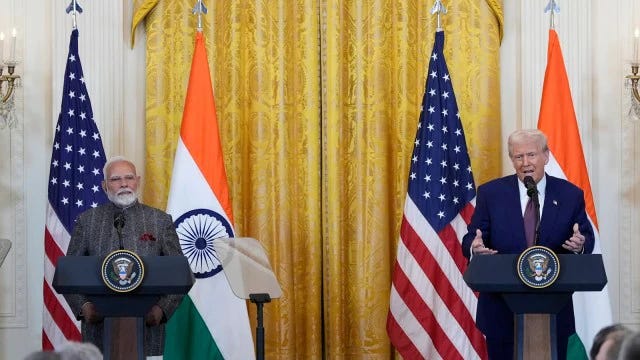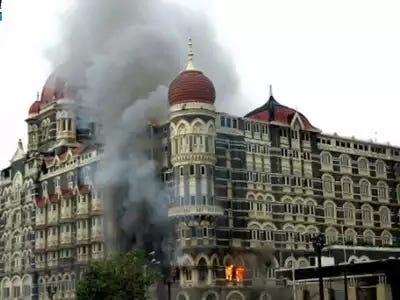President Trump Announces Tahawwur Rana’s Extradition, Strengthening of India-US Ties
With Modi’s leadership and strong US-India ties, this is a defining moment in war on terrorism. Extradition of Rana is conclusive proof that exposes Pakistan’s evil strategy of harbouring terrorists.

US Approves Tahawwur Rana’s Extradition to India
In a historic decision that underscores the strength of the India-US counterterrorism alliance, the United States has approved the extradition of Tahawwur Rana to India. Rana, a key conspirator in the 2008 Mumbai attacks, will finally face trial for his role in enabling one of the most brutal acts of terror in modern history. This marks not just a victory for justice but a significant blow to Pakistan-backed terrorism, which has long operated under state-sponsored impunity.
President Trump’s Announcement: A Strong Stand Against Terrorism
During a joint press conference (click to view video released by the White House) with Indian Prime Minister Narendra Modi on February 14 in Washington DC, President Donald Trump made the landmark announcement:
"I am pleased to announce that my administration has approved the extradition of one of the plotters [Tahawwur Rana] and one of the very evil people of the world, having to do with the horrific 2008 Mumbai terrorist attack, to face justice in India. He is going back to India to face justice.”
This statement, direct and uncompromising, signified a new era of accountability, where terrorists and their enablers will no longer be shielded by international borders. It also reinforced America’s commitment to standing with India against Pakistan-sponsored extremism.
Pakistan’s Role in 26/11: A State-Sponsored Act of Terror
The 2008 Mumbai attacks were not random acts of violence but a meticulously planned military-style operation executed by Pakistan-based Lashkar-e-Taiba (LeT) with direct involvement of the Inter-Services Intelligence (ISI). Over four days, 166 innocent people, including six Americans, were brutally murdered as gunmen targeted iconic landmarks such as the Taj Mahal Palace Hotel, Chhatrapati Shivaji Terminus, and Nariman House.
Multiple intelligence reports, international investigations, and even David Headley’s testimony have proven that this attack was planned, funded, and executed from Pakistan, with LeT leaders receiving direct support from ISI handlers. Despite this overwhelming evidence, Pakistan continues to harbour terrorists, including Hafiz Saeed and Zaki-ur-Rehman Lakhvi, the masterminds behind 26/11.
The extradition of Tahawwur Rana is a powerful message—one that reinforces India's determination to hold every perpetrator accountable, regardless of the obstacles Pakistan creates.
Who Is Tahawwur Rana? The Enabler of Terrorism
Born in Chichawatni, Pakistan, in 1961, Tahawwur Hussain Rana was once an officer in the Pakistan Army Medical Corps before immigrating to Canada in 1997. Later settling in the United States, he operated an immigration consultancy firm, First World Immigration Services, with offices in Chicago, New York, and Toronto.
However, his business was nothing more than a front for Lashkar-e-Taiba’s operations. Investigations revealed that Rana used his company to facilitate terrorist movements, issue fraudulent travel documents, and provide cover for reconnaissance missions. His deep personal ties to terrorism came through his long-time friendship with David Headley (Daood Gilani), the man who laid the foundation for the Mumbai attacks.
Through Rana’s assistance, Headley was able to enter India multiple times under a false identity, conducting detailed surveillance of Mumbai’s key targets. Without Rana’s logistical and financial support, the 26/11 attacks would not have been possible.
David Headley: The ISI’s Inside Man in Mumbai
If the Mumbai attacks were an act of war, then David Headley was Pakistan’s field commander on the ground. Born Daood Sayed Gilani, Headley was a Pakistani-American with deep-rooted ties to the ISI and LeT. He frequently traveled to Pakistan, where he was trained in LeT’s terror camps, all while operating under the guise of a U.S. Drug Enforcement Administration (DEA) informant.
Between 2006 and 2008, Headley conducted five reconnaissance missions in Mumbai, meticulously scouting high-value targets such as:
Taj Mahal Palace Hotel
Chhatrapati Shivaji Terminus
Nariman House
He videotaped and mapped out attack plans while passing the intelligence directly to his ISI and LeT handlers in Pakistan. His information allowed LeT operatives to execute their attacks with military precision.
Headley was arrested in Chicago in 2009 but cut a plea deal with U.S. authorities, agreeing to cooperate in exchange for avoiding the death penalty and extradition to India. Despite his unquestionable guilt, he remains in a U.S. federal prison, while Pakistan continues to shield the masterminds of 26/11.
Legal Battles and Rana’s Inevitable Extradition
Since his arrest in 2009, Rana fought a decade-long legal battle to evade extradition to India. In 2011, a U.S. federal court convicted him for providing material support to LeT in a separate terror plot against a Danish newspaper but acquitted him of direct involvement in the Mumbai attacks—a grave oversight that India has now corrected.
Despite multiple legal appeals, his extradition requests were upheld by U.S. courts, with the Supreme Court rejecting his final appeal on January 21, 2025. Now, with the legal barriers cleared, Rana will finally be sent to India to stand trial for his crimes.
A Game-Changer for India-US Relations
Beyond its significance in the pursuit of justice, the extradition of Rana represents a new chapter in India-US relations. Under the Modi-Trump era, the two nations forged an unshakable alliance based on:
✅ Counterterrorism cooperation
✅ Strategic defense partnerships
✅ Crackdown on Pakistan-backed terrorism
Trump’s administration took historic actions against Pakistan’s duplicity, including:
✔ Suspending military aid to Pakistan
✔ Placing Pakistan on the FATF "grey list" for failing to curb terror financing
✔ Strengthening intelligence-sharing with India
The Rana extradition is another bold step that reinforces America’s commitment to India’s fight against terrorism. Pakistan can no longer rely on diplomatic maneuvering to protect terrorists from facing justice.
Modi-Trump: A Personal Friendship That Changed the Game
One of the most striking aspects of Indo-US relations in recent years has been the strong personal bond between Prime Minister Narendra Modi and President Donald Trump. Their high-profile meetings, from ‘Howdy Modi’ in Houston to ‘Namaste Trump’ in Ahmedabad, showcased a genuine partnership that transcended politics.
Trump’s decision to extradite Rana, despite Pakistan’s lobbying, is a testament to this trust and collaboration. Unlike previous administrations that hesitated in dealing firmly with Pakistan, Trump called out Islamabad’s terror links and acted decisively.
In Summary: A Warning to Pakistan and a Win for Justice
The extradition of Tahawwur Rana is a historic moment in India’s counterterrorism efforts. It is not just about bringing one man to justice, but about sending an undeniable message to Pakistan and terror sponsors worldwide: No terrorist or enabler will escape India’s reach.
With Modi’s leadership and strong US-India ties, this is a defining moment in the global war on terrorism. The extradition of Rana is proof that Pakistan’s strategy of harbouring terrorists will no longer be tolerated. As Rana is brought to India to stand trial, the pursuit of justice continues—and Pakistan must know that the world is watching.




